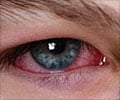A new study has found that doing physical activity when using eyewear, known as stroboscopic training, is effective in increasing visual short term memory.

Participants completed a computer-based visual memory test before and after the physical activities. Research participants came from the Duke community. Many were recruited from University-organized sports teams, including varsity-level players. The study found that participants who trained with the strobe eyewear gained a boost in visual memory abilities.
Participants completed a memory test that required them to note the identity of eight letters of the alphabet that were briefly displayed on a computer screen. After a variable delay, participants were asked to recall one of the eight letters. On easy-level trials, the recall prompt came immediately after the letters disappeared, but on more difficult trials, the prompt came as late as 2.5 seconds following the display. Because participants did not know which letter they would be asked to recall, they had to retain all of the items in memory.
"Humans have a memory buffer in their brain that keeps information alive for a certain short-lived period. Wearing the strobe eyewear during the physical training seemed to boost the ability to retain information in this buffer," said Greg Appelbaum, assistant professor of psychiatry at Duke University and first author of the study.
The strobe eyewear disrupts vision by only allowing the user to see glimpses of the world. The user must adjust their visual processing in order to perform normally, and this adjustment produces a lingering benefit; once participants removed the strobe eyewear, there was an observed boost in their visual memory retention, which was found to last 24 hours.
Earlier work by Appelbaum and the project's senior researcher, Stephen Mitroff, had shown that stroboscopic training improves visual perception, including the ability to detect subtle motion cues and the processing of briefly presented visual information. Yet the earlier study had not determined how long the benefits might last.
Advertisement
"This project takes a big step by showing that these improved perceptual abilities are driven, at least in part, by improvements in visual memory."
Advertisement
The study was recently published online in Attention, Perception, and Psychophysics.
Source-ANI














